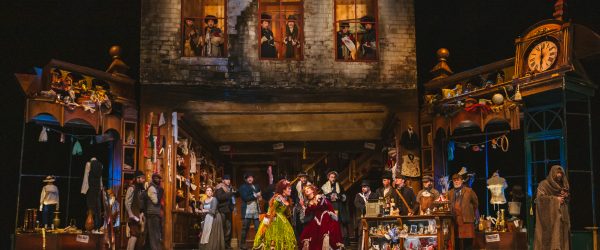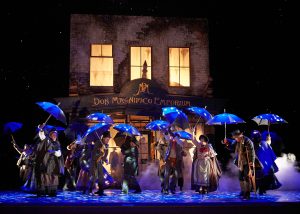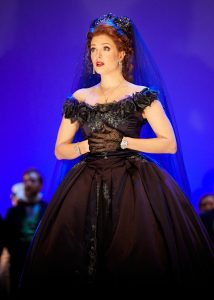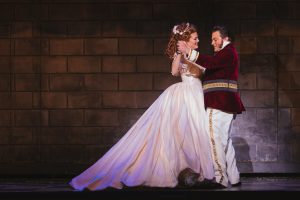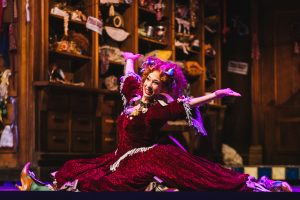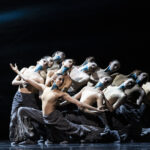The classic folk tale of Cinderella has been told in literally thousands of different ways in many languages. After seeing the version onstage at Seattle Opera, I can think of no better way to express the joy, ecstasy, and fantasy of this classic tale than pairing the soaring, virtuosic style of Rossini with the exuberant and inventive style and overall force that is stage director Lindy Hume.
In classic Hume style, there is no moment wasted onstage. The overture is used to great effect showing Prince Ramiro “conducting” his way through an old-school slide show of the eligible ladies of the land and his entourage (including his valet, Dandini) flutters about the castle. As the opera proper opens, we are introduced to Rossini’s versions of the evil stepsisters, Clorinda and Tisbe along with our heroine, Angelina, aka Cinderella. When a beggar comes to the door (spoiler – it is actually Prince Ramiro’s tutor and mentor Alidoro in disguise) it is no surprise that Clorinda and Tisbe are instantly rude and dismissive while Cinderella is warm and inviting and incredibly kind to the stranger. After a large fanfare announcing the impending arrival of the Prince (who just happens to be on the hunt for a bride) there is such a to-do amongst the sisters that the boorish Don Magnifico has been forced from his bed. Once caught up to speed, he insists that one of his daughters must win the heart of the Prince thus showering him with the fortune to which he feels he is entitled.

Miriam Costa-Jackson (Clordina), Peter Kalman (Don Magnifico), and Maya Gour (Tisbe). Philip Newton photo
When the Prince Romiro arrives, he is disguised as his own valet. He meets and is immediately smitten by Cinderella and she with him. Then, in stomps Dandini dressed as the Prince and everyone is invited to a ball. The stepsisters fawn, Don Magnifico claims is third daughter is dead, and Cinderella is left home alone. Alidoro, having shed is beggar costume, all but bibbidy-bobbidy-boos and gets Cinderella ready for the ball.
At the ball, Magnifico, Clorinda, and Tisbe continue to be terrible and the enigmatic woman in the veil captures everyone’s attention though, they all agree she looks an awful lot like someone they know. Cinderella admits to Dandini (who she thinks is the Prince) that she loves his valet (who is actually the prince). She leaves Romiro with a one of a matching set of bracelets along with instructions to come and find her and the bracelet’s match.
Though this version of the fairytale differs greatly from the Disney cartoon, it still ends happily ever after with a wedding and the true fulfillment of the title of the opera: La Cenerentola, ossia La bonità in trionfo (Cinderella, or Goodness Triumphant).
The success of this opera lies squarely on the shoulders of the titular character of Cinderella and in this production, Wallis Giunta (sung alternately by Seattle favorite Ginger Costa-Jackson) is more than up for the challenge. Giunta has charm and charisma enough for 10 ingénues but there is also a layer of strength and a sense of agency often missing from fairytale heroines. Her mezzo is effortlessly agile, her low notes are sumptuous and her high notes clear and vibrant. Opposite Giunta is Matthew Grills (sung on alternate performances by Michele Angelini) as the charming and handsome Prince. The two have an instant and palpable chemistry. While Grills is truly dazzling in the big, flashy moments (of which he has many) it is the quieter, sweeter moments of the Cinderella/Prince duet that really take one’s breath away.
If one came to McCaw Hall with preconceived notions about stuffy, stagy, “park-and-bark” opera singers, they were obliterated the moment Clorinda (Miriam Costa-Jackson) and Tisbe (Maya Gour) came onstage. The two are beautifully silly and campy and play off each other hilariously. They maintain their gorgeous tones all while milking every laugh possible from every scene. As the mischievous valet Dandini is Jonathan Michie (sung on alternate performances by Joo Won Kang). Michie brings a marvelous and playful physicality to the role along with a resonant baritone sound.
As Seattle audiences will have come to expect, Hume has created a full world inside McCaw Hall. The chorus is always active and interesting. All of the relationships have depth and meaning. The staging is lively (special shout out to the Associate Stage Director and Choreographer Daniel Pelzig) and we are constantly being treated to new and innovative ways of telling the story.
Cinderella is playing at Marion Oliver McCaw Hall in Italian with English subtitles through November 1. Evening performances at 7:30 p.m. and matinees at 2 p.m. For tickets and more information, visit www.seattleopera.org.


